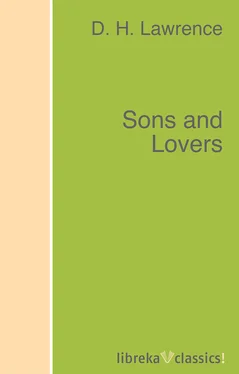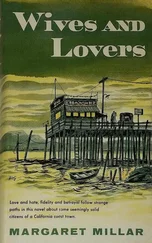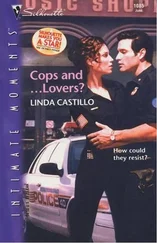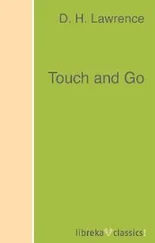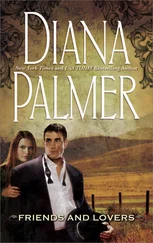D. Lawrence - Sons and Lovers
Здесь есть возможность читать онлайн «D. Lawrence - Sons and Lovers» — ознакомительный отрывок электронной книги совершенно бесплатно, а после прочтения отрывка купить полную версию. В некоторых случаях можно слушать аудио, скачать через торрент в формате fb2 и присутствует краткое содержание. ISBN: , Жанр: Языкознание, на английском языке. Описание произведения, (предисловие) а так же отзывы посетителей доступны на портале библиотеки ЛибКат.
- Название:Sons and Lovers
- Автор:
- Жанр:
- Год:неизвестен
- ISBN:9783742901897
- Рейтинг книги:4 / 5. Голосов: 1
-
Избранное:Добавить в избранное
- Отзывы:
-
Ваша оценка:
- 80
- 1
- 2
- 3
- 4
- 5
Sons and Lovers: краткое содержание, описание и аннотация
Предлагаем к чтению аннотацию, описание, краткое содержание или предисловие (зависит от того, что написал сам автор книги «Sons and Lovers»). Если вы не нашли необходимую информацию о книге — напишите в комментариях, мы постараемся отыскать её.
Immerse yourself in well-known and popular titles!
Sons and Lovers — читать онлайн ознакомительный отрывок
Ниже представлен текст книги, разбитый по страницам. Система сохранения места последней прочитанной страницы, позволяет с удобством читать онлайн бесплатно книгу «Sons and Lovers», без необходимости каждый раз заново искать на чём Вы остановились. Поставьте закладку, и сможете в любой момент перейти на страницу, на которой закончили чтение.
Интервал:
Закладка:
She went over the sheep-bridge and across a corner of the meadow to the cricket-ground. The meadows seemed one space of ripe, evening light, whispering with the distant mill-race. She sat on a seat under the alders in the cricket-ground, and fronted the evening. Before her, level and solid, spread the big green cricket-field, like the bed of a sea of light. Children played in the bluish shadow of the pavilion. Many rooks, high up, came cawing home across the softly-woven sky. They stooped in a long curve down into the golden glow, concentrating, cawing, wheeling, like black flakes on a slow vortex, over a tree clump that made a dark boss among the pasture.
A few gentlemen were practising, and Mrs. Morel could hear the chock of the ball, and the voices of men suddenly roused; could see the white forms of men shifting silently over the green, upon which already the under shadows were smouldering. Away at the grange, one side of the haystacks was lit up, the other sides blue-grey. A waggon of sheaves rocked small across the melting yellow light.
The sun was going down. Every open evening, the hills of Derbyshire were blazed over with red sunset. Mrs. Morel watched the sun sink from the glistening sky, leaving a soft flower-blue overhead, while the western space went red, as if all the fire had swum down there, leaving the bell cast flawless blue. The mountain-ash berries across the field stood fierily out from the dark leaves, for a moment. A few shocks of corn in a corner of the fallow stood up as if alive; she imagined them bowing; perhaps her son would be a Joseph. In the east, a mirrored sunset floated pink opposite the west's scarlet. The big haystacks on the hillside, that butted into the glare, went cold.
With Mrs. Morel it was one of those still moments when the small frets vanish, and the beauty of things stands out, and she had the peace and the strength to see herself. Now and again, a swallow cut close to her. Now and again, Annie came up with a handful of alder-currants. The baby was restless on his mother's knee, clambering with his hands at the light.
Mrs. Morel looked down at him. She had dreaded this baby like a catastrophe, because of her feeling for her husband. And now she felt strangely towards the infant. Her heart was heavy because of the child, almost as if it were unhealthy, or malformed. Yet it seemed quite well. But she noticed the peculiar knitting of the baby's brows, and the peculiar heaviness of its eyes, as if it were trying to understand something that was pain. She felt, when she looked at her child's dark, brooding pupils, as if a burden were on her heart.
"He looks as if he was thinking about something—quite sorrowful," said Mrs. Kirk.
Suddenly, looking at him, the heavy feeling at the mother's heart melted into passionate grief. She bowed over him, and a few tears shook swiftly out of her very heart. The baby lifted his fingers.
"My lamb!" she cried softly.
And at that moment she felt, in some far inner place of her soul, that she and her husband were guilty.
The baby was looking up at her. It had blue eyes like her own, but its look was heavy, steady, as if it had realised something that had stunned some point of its soul.
In her arms lay the delicate baby. Its deep blue eyes, always looking up at her unblinking, seemed to draw her innermost thoughts out of her. She no longer loved her husband; she had not wanted this child to come, and there it lay in her arms and pulled at her heart. She felt as if the navel string that had connected its frail little body with hers had not been broken. A wave of hot love went over her to the infant. She held it close to her face and breast. With all her force, with all her soul she would make up to it for having brought it into the world unloved. She would love it all the more now it was here; carry it in her love. Its clear, knowing eyes gave her pain and fear. Did it know all about her? When it lay under her heart, had it been listening then? Was there a reproach in the look? She felt the marrow melt in her bones, with fear and pain.
Once more she was aware of the sun lying red on the rim of the hill opposite. She suddenly held up the child in her hands.
"Look!" she said. "Look, my pretty!"
She thrust the infant forward to the crimson, throbbing sun, almost with relief. She saw him lift his little fist. Then she put him to her bosom again, ashamed almost of her impulse to give him back again whence he came.
"If he lives," she thought to herself, "what will become of him—what will he be?"
Her heart was anxious.
"I will call him Paul," she said suddenly; she knew not why.
After a while she went home. A fine shadow was flung over the deep green meadow, darkening all.
As she expected, she found the house empty. But Morel was home by ten o'clock, and that day, at least, ended peacefully.
Walter Morel was, at this time, exceedingly irritable. His work seemed to exhaust him. When he came home he did not speak civilly to anybody. If the fire were rather low he bullied about that; he grumbled about his dinner; if the children made a chatter he shouted at them in a way that made their mother's blood boil, and made them hate him.
On the Friday, he was not home by eleven o'clock. The baby was unwell, and was restless, crying if he were put down. Mrs. Morel, tired to death, and still weak, was scarcely under control.
"I wish the nuisance would come," she said wearily to herself.
The child at last sank down to sleep in her arms. She was too tired to carry him to the cradle.
"But I'll say nothing, whatever time he comes," she said. "It only works me up; I won't say anything. But I know if he does anything it'll make my blood boil," she added to herself.
She sighed, hearing him coming, as if it were something she could not bear. He, taking his revenge, was nearly drunk. She kept her head bent over the child as he entered, not wishing to see him. But it went through her like a flash of hot fire when, in passing, he lurched against the dresser, setting the tins rattling, and clutched at the white pot knobs for support. He hung up his hat and coat, then returned, stood glowering from a distance at her, as she sat bowed over the child.
"Is there nothing to eat in the house?" he asked, insolently, as if to a servant. In certain stages of his intoxication he affected the clipped, mincing speech of the towns. Mrs. Morel hated him most in this condition.
"You know what there is in the house," she said, so coldly, it sounded impersonal.
He stood and glared at her without moving a muscle.
"I asked a civil question, and I expect a civil answer," he said affectedly.
"And you got it," she said, still ignoring him.
He glowered again. Then he came unsteadily forward. He leaned on the table with one hand, and with the other jerked at the table drawer to get a knife to cut bread. The drawer stuck because he pulled sideways. In a temper he dragged it, so that it flew out bodily, and spoons, forks, knives, a hundred metallic things, splashed with a clatter and a clang upon the brick floor. The baby gave a little convulsed start.
"What are you doing, clumsy, drunken fool?" the mother cried.
"Then tha should get the flamin' thing thysen. Tha should get up, like other women have to, an' wait on a man."
"Wait on you—wait on you?" she cried. "Yes, I see myself."
"Yis, an' I'll learn thee tha's got to. Wait on ME, yes tha sh'lt wait on me—"
"Never, milord. I'd wait on a dog at the door first."
"What—what?"
He was trying to fit in the drawer. At her last speech he turned round. His face was crimson, his eyes bloodshot. He stared at her one silent second in threat.
"P-h!" she went quickly, in contempt.
He jerked at the drawer in his excitement. It fell, cut sharply on his shin, and on the reflex he flung it at her.
Читать дальшеИнтервал:
Закладка:
Похожие книги на «Sons and Lovers»
Представляем Вашему вниманию похожие книги на «Sons and Lovers» списком для выбора. Мы отобрали схожую по названию и смыслу литературу в надежде предоставить читателям больше вариантов отыскать новые, интересные, ещё непрочитанные произведения.
Обсуждение, отзывы о книге «Sons and Lovers» и просто собственные мнения читателей. Оставьте ваши комментарии, напишите, что Вы думаете о произведении, его смысле или главных героях. Укажите что конкретно понравилось, а что нет, и почему Вы так считаете.
